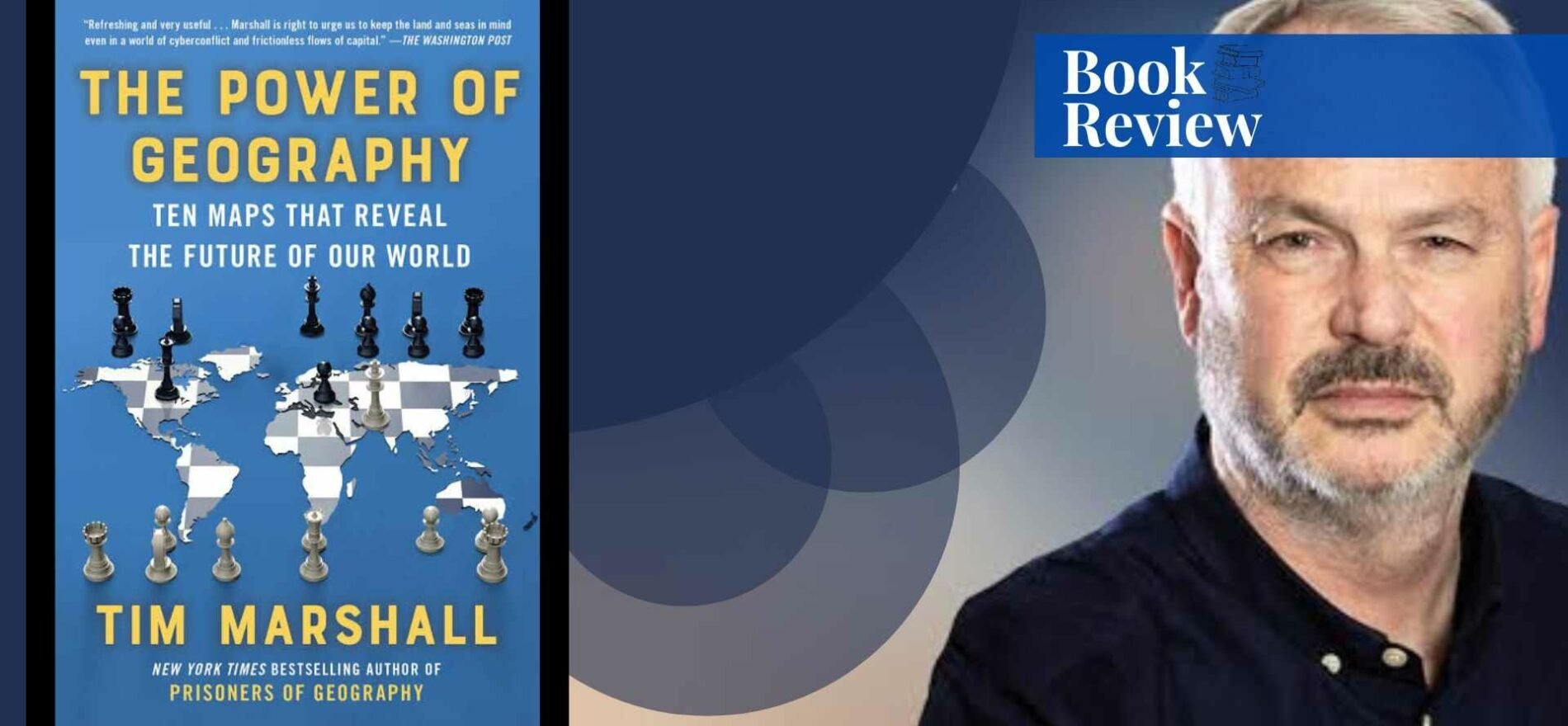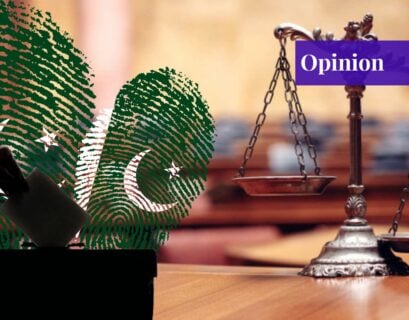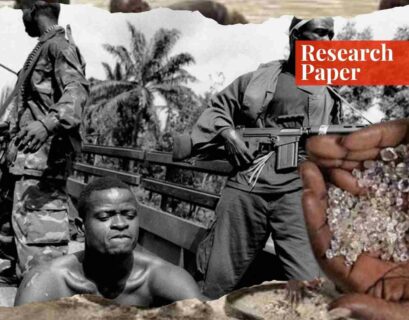Sadia Iqbal is an MPhil candidate and a researcher interested in global geopolitical issues. She is also a gold medalist in the 2020 MA batch of Punjab University.
The Power of Geography: Ten Maps That Reveal the Future of Our World was written by Tim Marshall, a renowned journalist who worked for the BBC and Sky News. His famous books include Prisoners of Geography and Divided. In The Power of Geography, he explains the ten regions that are set to shape global politics in the era of the emerging multipolar world order. These regions include Australia, Iran, Saudi Arabia, the UK, Greece, Türkiye, the Sahel, Ethiopia, Spain, and Space. We will hereunder sequentially summarize the views of Marshall on each region.
Australia
Marshall explains that Australia, the continent located “at the bottom of the world,” was established as a penal colony in 1770. The changing geopolitical situation and the emergence of a new world order have made Australia, strategically, a crucial player in the Indo-Pacific region. The USA sees Australia and India as allies in that region to constrain the biggest economic giant—China. Concurrently, Australia will have to manage its relations with China, its biggest trading partner in the region. Hence, Australia faces tough choices and if it makes the wrong move, it will become part of the Indo-Pacific cold war.
Iran
Present-day Iran was part of the Persian Empire, which emerged on the world stage in 550 BCE and is infamous for its repressive regime. Although the country faced multiple invasions, two events are considered the turning points in Iran’s history. The first was when King Ismail announced Shia Islam as an official religion in 1501. The conversion to Shi’ism created regional opposition against Iran which subsequently led to present-day tensions mainly with Saudi Arabia in Lebanon, Syria, and Yemen). The second event was the 1979 revolution which overthrew the Shah of Iran. It contributed to the Iran-Iraq War, shaped the present-day political and revolutionary theocracy, and dictated its relation with foreign powers.
Saudi Arabia
Marshall explains the region by putting into context the topography and history of the oil-rich state of Saudi Arabia. The state got into an alliance with Wahhabism to strengthen its influence in the region; however, the state’s multiple international and domestic policies faced sufficient religious resilience, which culminated in the birth of the international jihadist group Al-Qaeda.
The new leadership of Muhammad Bin Salman has no other option but to modernize religious ruling and introduce reforms to restructure the economy, as the state has an abundance of oil but the world is weaning itself off of oil. To adapt to the 21st century, the state will have to modernize and implement technology; otherwise, it won’t have much to offer the world.
United Kingdom
Due to its geography, the United Kingdom developed in relative isolation and yet became one of the greatest empires in the world. However, this psychology of “separateness” influenced the national mindset of the people, as seen in the Brexit vote in 2016. The main challenge the UK is facing after Brexit is: what if Scotland becomes independent? The Scottish independence referendum of 2014 suggested that more than 55% of people wanted to stay in the UK, but this was the case when the UK was in the EU. After Brexit, support for the EU is much higher in Scotland than support for the UK. This political division may encourage separatism in Northern Ireland.
Greece
Present-day Greece was part of the most advanced civilization and empire of antiquity. Its mountains and waters are the key factors in understanding its geostrategic and geopolitical position. High ground and access to the sea necessitated the Greeks to be a naval power, bringing them into conflict with neighboring countries, mainly Türkiye. Multiple wars and international events caused economic misery in the country, which strained Greece’s relations with the EU, and patrolling 6,000 islands is expensive enough. Immigration is a new threat that has caused tension among EU members. The recent discovery of natural gas in the eastern Mediterranean Sea has refreshed the old rivalry between Greece and Türkiye.
Türkiye
For centuries, Türkiye was the main transit zone between Europe and Asia as it was part of the “glorious Ottoman Empire” (1200-1500). In World War I, by signing the 1918 armistice, great players laid down the Turkish founding story and radical reforms to modernize Türkiye by Kemal Ataturk. Türkiye sided with “the Allies” in World War II and as the Cold War environment was heating up, Ankara was granted NATO membership. This brought Türkiye in new age but with some old problems in the form of troublesome neighbors and issues with NATO. Under the leadership of Tayyip Erdogan, the country has adopted religious nationalism and neo-Ottomanism to regain maximum territorial gain and become a major player in the region.
Sahel
The Sahel is mainly shaped by two factors: extreme weather which caused the gradual settlement of people from north to south, and colonial expansion which left prolonged ramifications on the geography, political, and religious ideologies. Although colonial powers established trade routes which gave rise to Sahelian empires and brought prosperity to the region.
However, the artificial demarcation of the border gave birth to ethnic tension, resulting in the rise of militias and is causing present-day immigration issues within the region and in Europe. The discovery of rare earth metals has attracted foreign players to invest in the Sahel, but without good governance and security, these riches can be a source of tension within the region and outer world, especially in Europe.
Ethiopia
Ethiopia is the region from where all humans originated. It was never colonized and it built its own empire. Ethiopia’s waters define its geopolitical and geostrategic significance as it has an abundance of rivers and lakes, and supplying water to its neighbors provides political leverage over them. Ethiopia can bring regional stability through multiple economic projects as technology and cheap electricity allowed the state to become a regional power. Ethiopia’s major imports and exports mostly pass through its neighbors’ territory. However, Ethiopia is located at the center of the most troubled region; its neighbors have experienced multiple civil wars. To face these challenges, Ethiopia needs peaceful relations with its neighbors.
Spain
Spain’s geography played a crucial role in shaping its strong regional and cultural identities. The mountainous terrain and size of the country have always hampered the trade links and strong central political control. However, even at the height of Spain’s power, its geography constrained its political unity and economic activity. After experiencing an era of being a colonial power and part of great wars, in recent times, Spain is facing a nationalist movement resistance in Catalonia which wants full independence from Spain. However, Catalonia is strategically and economically very important for the country and Spain will have to struggle to get a strong hold over it.
Space
Space fascinates everyone but there is a lot of science involved in this chapter which requires having a deeper understanding of science. Tim Marshall explains about space treaties and science technology which will not be dealt with here as the main crux of this chapter is that space technology may lead major players towards cooperation in the field of technology. However, it would not necessarily end the conflict between states on earth.
Critical Analysis
The book The Power of Geography focuses on regions that Tim Marshall believes have the potential to shape the geopolitics of the coming decades. He emphasizes that future conflicts may emerge around these regions due to the direct and indirect involvement of great power rivalry. This book provides great insights into the confluence of geography, history, border, and regional disputes together with modern politics. Through historical and geographical background, Marshall emphasizes that rivers, sea lanes, and mountain ranges determine the ideological, cultural, and political choices of the country.
Among the richest qualities of The Power of Geography, the most dominating feature is its readability. Marshall is a wonderful narrator who tries to discuss every region with concise information in the manner of telling a story. Hence, he provides an efficient understanding of each region and makes it easy to pick the key points in every chapter. This narrative ability shines through probably because of his background as a journalist.
Analyzing the work critically, I feel that at some points Marshall over-exaggerates the importance of geography as in the case of the UK and Spain region. He argues that the independence of Catalonia and Scotland threatens Spain and the UK due to their reliance on these regions against any invasion. This is a myopic view as there are several political factors including economic and strategic policies which the former and latter will have to face. He appears to ignore these other factors.
Similarly, in the case of Iran, Marshall partially credits Iran’s geographic features which have constrained Tehran in developing its relation with foreign powers. But again, the ideological underpinnings of Iran’s political choices are ignored. In contrast, he very well connects the jumbled threads around Türkiye and Greece’s relations with their geographical features and how the discovery of oil resources in the region has refreshed the old rivalries.
Elsewhere, Marshall rightly acknowledges that with the emerging multipolar world order and technology, the significance of the physical barriers has changed over time, as in the case of Saudi Arabia and Ethiopia. Nonetheless, Marshall is an amazing storyteller who provides a deep understanding of countries’ history, maps, and borders. The Power of Geography is a highly suggested reading, especially for those who are interested in geopolitics and international relations.
If you want to submit your articles, research papers, and book reviews, please check the Submissions page.
The views and opinions expressed in this article/paper are the author’s own and do not necessarily reflect the editorial position of Paradigm Shift.


















